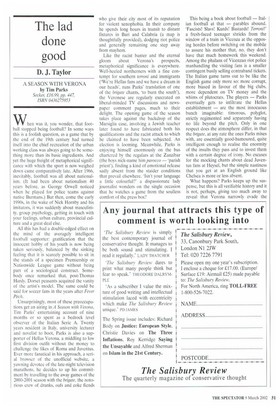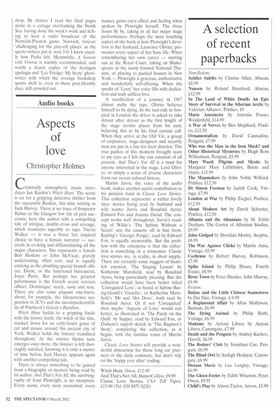The lad done good
D. J. Taylor
A SEASON WITH VERONA by Tim Parks Seeker, 416.99, pp. 447, ISBN 0436275953 When was it, you wonder, that football stopped being football? In some ways this is a foolish question, as a game that by the end of the 19th century had turned itself into the chief recreation of the urban working class was always going to be something more than its basic ingredients. And yet the huge freight of metaphorical significance with which the sport is now weighed down came comparatively late. After 1966, inevitably, football was all about nationalism. (It had been about nationalism 40 years before, as George Orwell noticed when he played for police teams against native Burmans.) But then, come the early 1990s, in the wake of Nick Hornby and his imitators, it was suddenly about masculinity, group psychology, getting in touch with your feelings, urban culture, provincial culture and a great deal else.
All this has had a double-edged effect on the mind of the averagely intelligent football supporter: gratification that the innocent hobby of his youth is now being taken seriously, balanced by the sinking feeling that it is scarcely possible to sit in the stands of a specimen Premiership or Nationwide League game without being part of a sociological construct. Somebody once remarked that, post-Thomas Hardy. Dorset peasants acquired the vanity of the artist's model. The same could be said for soccer fans in the years after Fever Pitch.
Unsurprisingly, most of these preoccupations get an airing in A Season with Verona, Tim Parks' entertaining account of nine months or so spent as a bedrock level observer of the Italian Serie A. Twenty years resident in Italy, university lecturer and novelist to boot, Parks is also a supporter of Hellas Verona, a middling to low first division outfit without the money to challenge the likes of Roma and Juventus. Ever more fanatical in his approach, a serial browser of the unofficial website, a yawning devotee of the late-night television marathons, he decides to up his commitment by travelling to the away games of the 2000-2001 season with the brigate, the notorious crew of drunks, oafs and coke fiends who give their city most of its reputation for violent xenophobia. In their company he spends long hours in transit to distant fixtures in Bari and Calabria (a map is thoughtfully provided), dodging riot police and generally remaining one step away from mayhem.
Like the racist banter and the eternal gloom about Verona's prospects, metaphorical significance is everywhere. Well-heeled northerners with a fine contempt for southern terroni and immigrants ('We're Hellas fans and we have a dream in our heads', runs Parks' translation of one of the brigate chants, 'to burn the south'), the Veronese are regularly execrated on liberal-minded TV discussions and newspaper comment pages, much to their delight. The opening game of the season takes place against the backdrop of the Marsiglia case, involving a Jewish teacher later found to have fabricated both his qualifications and the racist attack to which he claimed to have been subjected. An election is looming. Meanwhile. Parks is enjoying himself enormously on the bus chartered by the regulars at the Zanzibar (the boys nick-name him parocco — 'parish priest'), finding a kind of emotional release sadly absent from the staider conditions that prevail elsewhere. 'Isn't your language a little colourful?' a dispassionate lady journalist wonders on the single occasion that he watches a game from the soulless comfort of the press box?
This being a book about football — Italian football at that — parables abound. 'Fascists! Slays! Kurds! Bastards! Terronir a fresh-faced teenager shrieks from the window of a train in Vicenza at the opposing hordes before switching on the mobile to assure his mother that, no, they don't have that much homework this weekend. Among the phalanx of Vicenzan riot police manhandling the visiting fans is a smaller contingent busily selling contraband tickets. The Italian game turns out to be like the English game only more so: more corrupt, more biased in favour of the big clubs, more dependent on TV money and the whims of plutocrats. The players — Parks eventually gets to infiltrate the Hellas establishment — are the most innocuous bunch imaginable: timorous, polyglot, strictly regimented and apparently having no life beyond the pitch. Only in one respect does the atmosphere differ, in that the bngate, at any rate the ones Parks mixes with, are essentially good-humoured, quite intelligent enough to realise the enormity of the insults they pass and to invest them with a certain degree of irony. No excuses for the mocking chants about dead Juventus fans at Heysel, but the simple nastiness that you get at an English ground like Chelsea is more or less absent.
What happens? Parks keeps up the suspense, but this is all verifiable history and it is not, perhaps, giving too much away to reveal that Verona narrowly evade the drop. By chance I read the final pages alone in a cottage overlooking the North Sea, having done the week's work and itching to hear a radio broadcast of the Norwich-Preston game. Norwich, forever 'challenging for the play-off places' as the sports writers put it, won 3-0: I knew exactly how Parks felt. Meanwhile, A Season with Verona is warmly recommended, and worth a dozen copies of the hooligan apologia and tee Fredge: My Story' ghostwrites with which the average bookshop sports shelf is, even in these post-Hornby days, still crowded out















































































 Previous page
Previous page